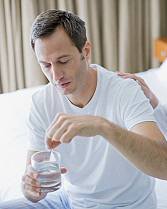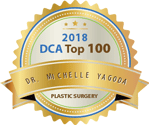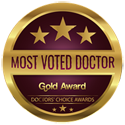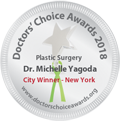 Stomach acid is made of the powerful hydrochloric acid. Your stomach is lined with mucus to help it resist corrosion, but the rest of your body is not similarly armored. That’s why your body takes great pains to keep this acid in the stomach where it belongs. In reflux disease, some of that acid washes up where it shouldn’t go. There are two types of reflux disease: laryngeal reflux (LPR) and gastroesophageal reflux (GERD).
Stomach acid is made of the powerful hydrochloric acid. Your stomach is lined with mucus to help it resist corrosion, but the rest of your body is not similarly armored. That’s why your body takes great pains to keep this acid in the stomach where it belongs. In reflux disease, some of that acid washes up where it shouldn’t go. There are two types of reflux disease: laryngeal reflux (LPR) and gastroesophageal reflux (GERD).
GERD, the more common variety of reflux disease, can be caused by laxity of the safety valve or sphincter at the lower end of the esophagus where it joins the stomach. Smoking further weakens the valve because it lowers valve pressure. Normally, the sphincter, a ring of muscle at the base of the esophagus, keeps the acid where it belongs—in the stomach. The sphincter isn’t always tight. It relaxes momentarily when you swallow to allow food to travel to your stomach before tightening again to prevent the acid from flowing up. In people with GERD, the sphincter relaxes even when you’re not swallowing, causing acid and food to flow back up. This may cause heartburn and eventually, corrosion of the esophagus. It is treated with diet modification, medication and sometimes surgery. If the symptoms don’t resolve within two months of conservative therapy, a referral to a gastroenterologist for an upper endoscopy may be indicated.
LPR is different from GERD. Instead of having laxity at the base of the esophagus, LPR sufferers usually have a malfunction at the upper end of the esophagus. Instead of rising acid damaging the esophagus, it affects the larynx or voice box. People with LPR typically do not have heartburn. Instead, they may experience the following:
Symptoms
- Chronic cough
- Hoarseness
- Increased need to clear mucous and phlegm
- Difficulty swallowing
- Sensation of having a lump in the throat
- Choking episodes
- Ear pain
- Burning sensation or nausea
Treatment
LPR treatment is usually entrusted to an otolaryngologist, a specialist of the ear, nose, and throat such as Dr. Yagoda. Therapy may include a combination of diet modification, lifestyle changes, stress reduction, alternative and homeopathic remedies, minerals, prescription antacids and acid blockers.
Medication
Nonprescription antacids such as Maalox and Zantac can be great for treating GERD but may be less effective on LPR. Proton pump inhibitors, however, such as Prilosec, Nexium and Prevacid can eventually eliminate stomach acid and allow damaged tissues to recover.
Lifestyle Changes
Because obesity and a high-fat diet can contribute to LPR, nutritional therapy can be very effective. Eliminating caffeine, acidic and spicy foods, and carbonated beverages can also help. Eating at least 3 hours before lying down and sleeping with the head elevated can also reduce symptoms. Ask Dr. Yagoda for a full list of lifestyle changes including behavior modification, stress reduction, meditation, acupuncture and biofeedback.
Surgery
Most cases of GERD and LPR are treated non-surgically, but in rare, severe cases, surgical options may be necessary.


































